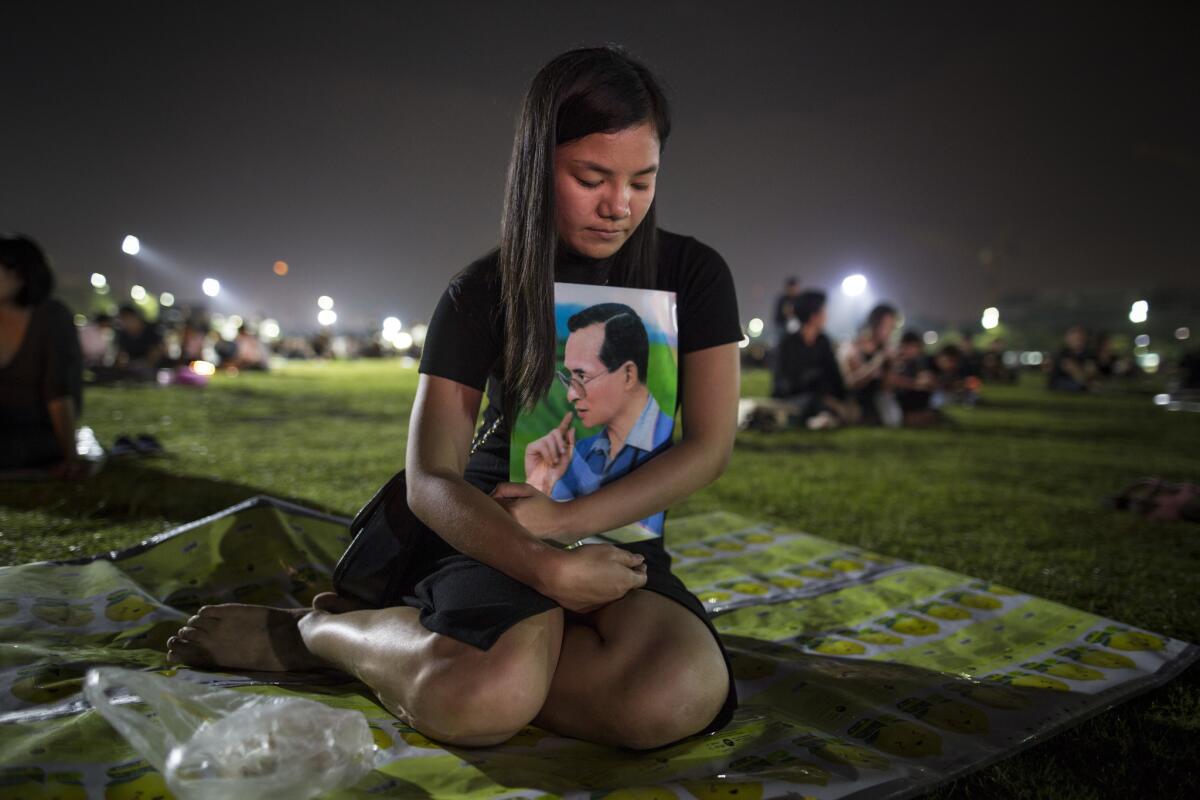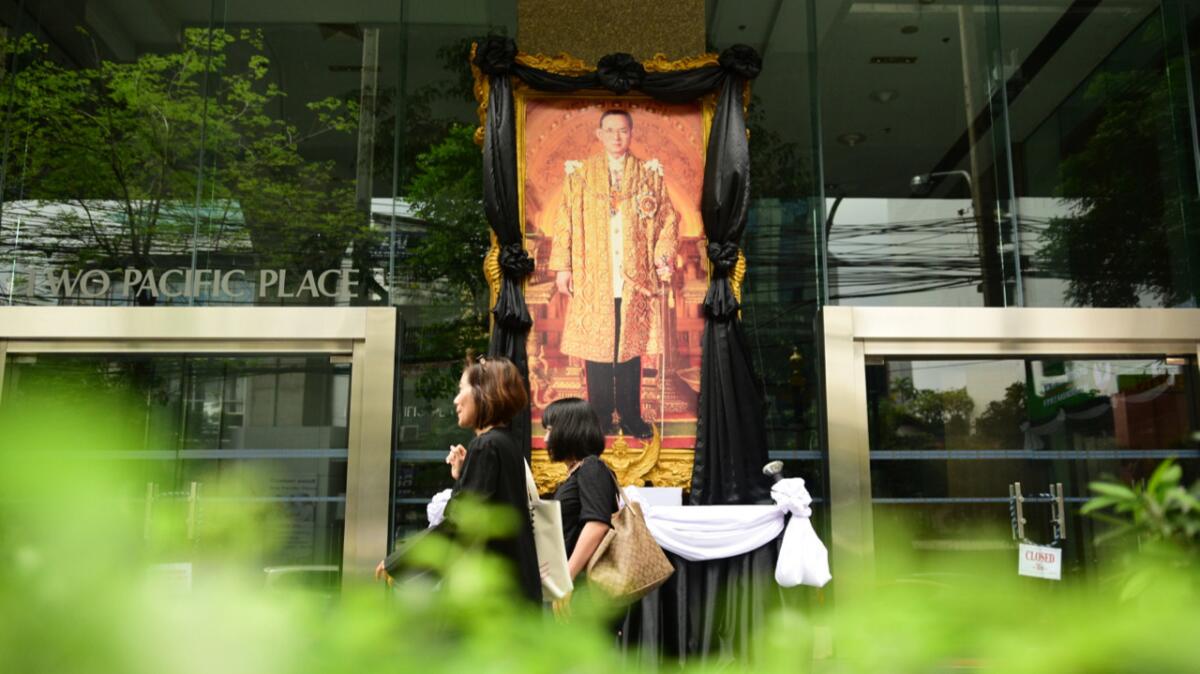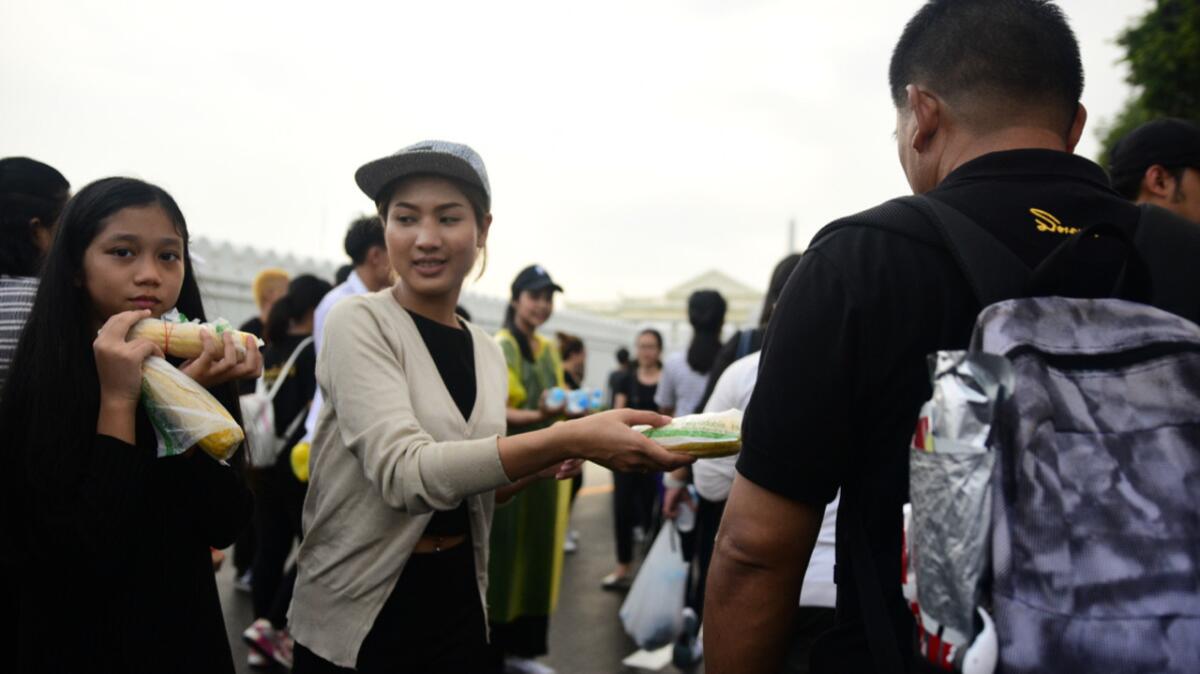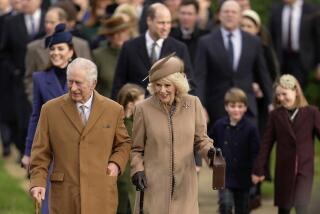Thailand grieves for its late king — and wonders when its crown prince will take the throne

- Share via
Reporting from Bangkok, Thailand — An afternoon downpour did not deter tens of thousands of black-clad Thais from converging on the Grand Palace and Temple of the Emerald Buddha on Sunday as they continued to mourn the loss of their late king, Bhumibol Adulyadej.
They could have a long time to grieve before Bhumibol’s eldest son and heir, 64-year-old Crown Prince Maha Vajiralongkorn, becomes king.
For the record:
1:43 p.m. Aug. 22, 2019An earlier version of this article said that King Bhumibol Adulyadej died Tuesday. He died Thursday.
In a surprise announcement, Vajiralongkorn said he will remain as crown prince until he has had time to mourn. Just how long that will take is not clear. But it could be as long as a year before Bhumibol is cremated, and there has been speculation that his son will wait until then to take the throne.
In the meantime, 96-year-old Gen. Prem Tinsulanonda, a former prime minister and the head of the privy council, a royal body appointed by Bhumibol, will be regent.
The Massachusetts-born king, who died Thursday at age 88, first sat on the Thai throne when Harry Truman was in the White House. His seven decades in office made him the world’s longest-reigning monarch, during which Thailand, long a U.S. ally, largely avoided the wars and oppression seen in neighbors Cambodia, Myanmar and Vietnam.
Prime Minister Prayuth Chan-ocha said after meeting the heir to the throne that the crown prince “asked the people not to be confused or concerned about government affairs, including the royal succession.”

It seems unlikely that the crown prince — a jetsetter who has divorced three times and spends much of his time in Germany — can command the same respect as Bhumibol. The late king was a polyglot photography enthusiast who spent decades meeting farmers and pushing development projects in rural Thailand.
And it’s unclear where Bhumibol’s passing leaves Thai politics, riven by regional and class-based factionalism for more than a decade. Although the throne is officially above politics, Bhumibol received not only respect but reverence from Thailand’s heads of government, be they elected or appointed. Still, he was ultimately unable to prevent factional enmity from spiraling into street protests and sometimes deadly violence.
Now the army is in control after seizing power in a 2014 coup, while the head of the ousted elected government, Yingluck Shinawatra, faces corruption charges.
Her elder brother and chief backer, Thaksin Shinawatra, remains in exile after fleeing charges of his own. Thaksin, a brash populist billionaire, was a rarity in Thailand’s electoral politics: He won elections convincingly and often.
He was removed from office in a coup a decade ago, and although parties backed by him in absentia have won Thailand’s subsequent elections, they have in turn been ousted either by the army or by the courts.
Thaksin’s electoral opponents have not managed a win since 1992, and the capital has been site of numerous mass protests and street fighting in the decade since Thaksin was removed, with his supporters mainly donning red and opponents in yellow, to signify loyalty to the throne.
A new constitution passed in August will restrict the powers of any future elected government — whenever the military relinquishes power.
But for now, it seems, millions of Thais will focus on the late king.

In a city known in recent years for its color-coded, sometimes violent political protests, the dominant hue for now is black, to signify grief.
“We don’t think about the future now,” said Wichai Sangkitpoi, standing outside the temple near the Chao Praya River running through Bangkok. “It is like losing a father for us, it is the same feeling.”
Roughneen is a special correspondent.
ALSO:
In Thailand, longtime king’s death opens country to political turmoil, instability
What makes Philippines President Rodrigo Duterte, who compared himself to Hitler, so popular
Why thousands of Iraqi fighters have poured into Syria to aid Assad
More to Read
Sign up for Essential California
The most important California stories and recommendations in your inbox every morning.
You may occasionally receive promotional content from the Los Angeles Times.













